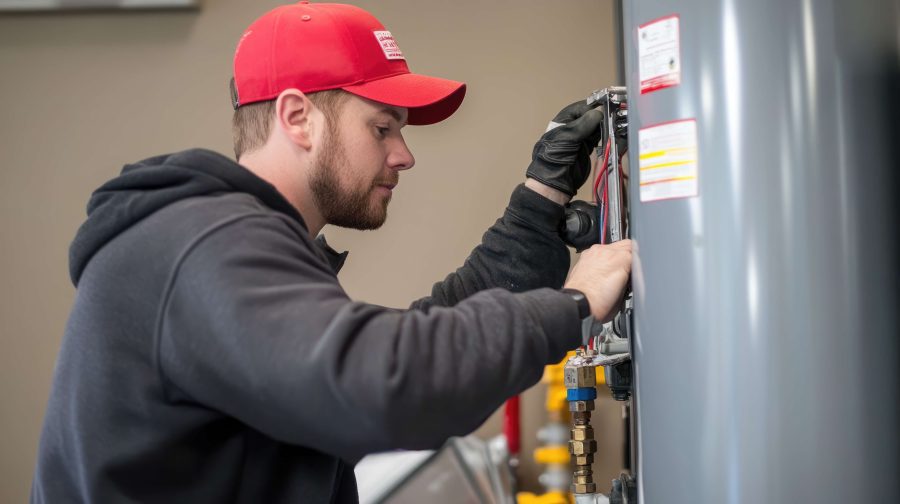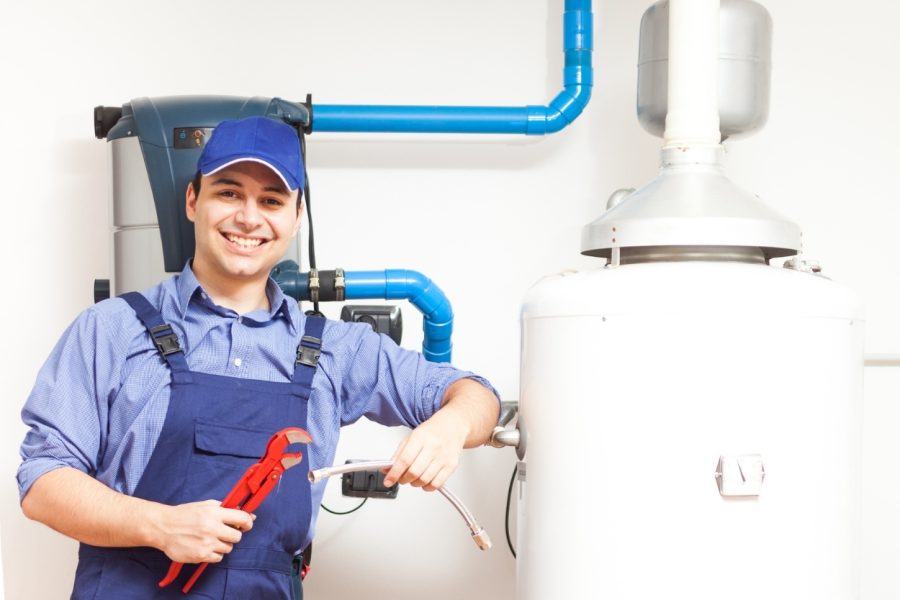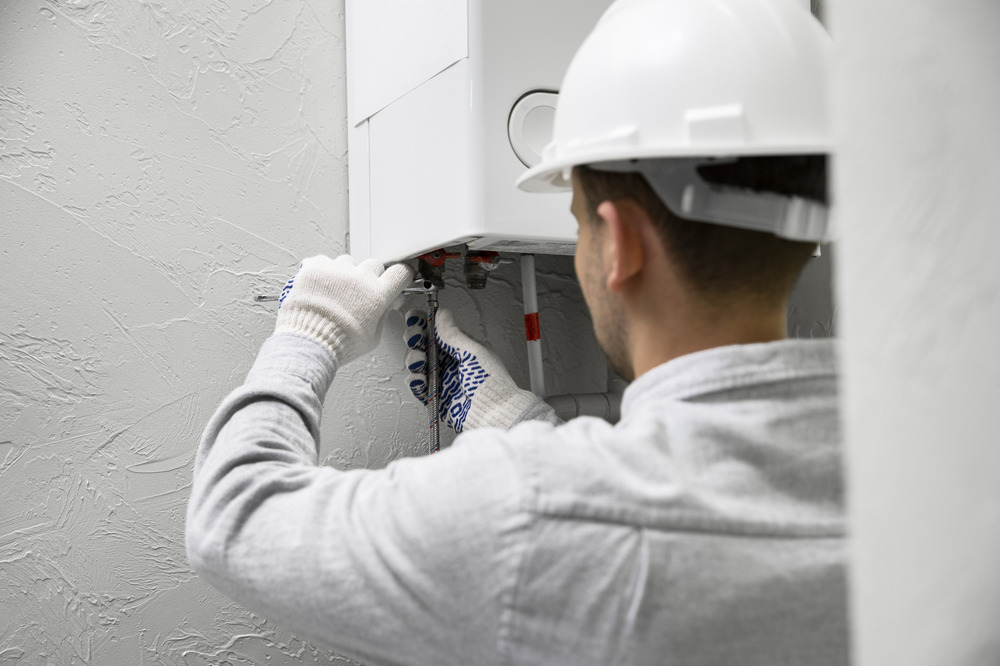Selecting the best water heater for a home is a decision that affects both comfort and energy efficiency. A well-chosen water heater ensures a steady supply of hot water while keeping energy costs manageable. The global water heater market is projected to expand at a Compound Annual Growth Rate (CAGR) of 4.7% between 2024 and 2030, reflecting the growing demand for advanced and efficient systems.
To make an informed decision, homeowners should evaluate their needs, understand the types of water heaters available, and consider crucial factors.
Table of Contents
Key Takeaways✔ Learn about the main types—storage tanks, tankless, heat pumps, solar, and combination boilers—to identify which suits the home best. ✔ Evaluate family size, peak water usage, and seasonal variations to determine the right capacity and performance requirements. ✔ Prioritize systems with high UEF ratings or ENERGY STAR certification to save on energy costs and reduce environmental impact. ✔ Check for space, venting, and potential plumbing or electrical upgrades to ensure compatibility with the home. ✔ Compare initial costs with operational and maintenance expenses to choose a system that offers the best value over time. ✔ Decide between electric, gas, propane, or solar based on availability, cost, and environmental considerations. ✔ Select a water heater with a strong warranty and research brand reputation for long-term reliability and performance. ✔ Hire a professional to ensure proper water heater installation, compliance with safety codes, and system longevity. ✔ Look for state and utility programs that offer financial incentives for energy-efficient water heaters to offset initial costs. ✔ Seek expert advice to evaluate needs, recommend suitable systems, and guarantee a seamless and efficient installation process. |
1. Evaluate Your Household’s Hot Water Requirements
Every household has unique hot water needs based on its size, water usage habits, and appliances. Calculating these requirements ensures the chosen water heater can meet peak demands without wasting energy.
- Family Size: Larger families typically need water heaters with greater capacity or higher flow rates. For instance, a family of four may require a 50-gallon tank water heater or a tankless system that can handle at least 6-9 gallons per minute.
- Simultaneous Usage: Homes where multiple people use hot water at once, such as during morning showers, need systems that can keep up with demand.
- Seasonal Considerations: In colder regions, water heaters may work harder to heat colder incoming water. Selecting energy-efficient water heaters with adequate capacity ensures consistent performance year-round.
2. Explore the Different Types of Water Heaters
Each water heater type has unique features that make it suitable for specific scenarios. Understanding these differences allows homeowners to choose systems that fit their preferences and circumstances.
Storage Tank Water Heaters
- Affordable and easy to install.
- Available in multiple sizes to suit varying household needs.
- Require regular maintenance, such as flushing to prevent sediment buildup.
Tankless Water Heaters
- Provide hot water only when needed, reducing energy consumption.
- A compact design ideal for homes with limited space.
- May require professional water heater installation due to higher power demands.
Heat Pump Water Heaters
- Use significantly less electricity than traditional systems.
- Ideal for homes in warmer climates where ambient air can be utilized.
- Require space for proper ventilation.
Solar Water Heaters
- Operate using renewable energy, drastically cutting energy costs.
- Require a sunny location and sufficient roof space for panels.
- May involve higher initial investment and maintenance costs.
Combination Boilers
- Serve dual purposes by providing both space heating and hot water.
- Suitable for smaller homes with moderate heating and water needs.
- Typically requires a professional plumber for installation.
3. Compare Energy Efficiency Ratings
Energy efficiency plays a pivotal role in selecting the right water heater, as it directly affects both the utility bills and the environmental impact of a household.
Energy Factor (EF) Ratings
The EF rating is an older standard that evaluates a water heater’s ability to convert energy into hot water. Higher EF ratings indicate greater efficiency, which translates to lower operating costs. While still relevant for some systems, EF ratings are gradually being replaced by more comprehensive metrics.
Key Components of EF Ratings
- The percentage of energy converted to heat
- How much energy is lost during standby and cycling periods
- The overall ability of the system to deliver hot water efficiently
Uniform Energy Factor (UEF)
UEF is the updated standard for evaluating water heater efficiency. It provides a more accurate representation by considering additional factors like standby heat loss, cycling losses, and varying usage patterns.
UEF Categories
- Low: For homes with minimal hot water usage.
- Medium: For average household usage.
- High: For large households with significant demand.
ENERGY STAR Certification
ENERGY STAR-certified water heaters meet stringent energy efficiency guidelines set by the U.S. Environmental Protection Agency (EPA). These systems often outperform standard models, offering significant savings on energy bills while reducing greenhouse gas emissions.
Benefits of ENERGY STAR Models
- Reduced energy consumption by up to 30% compared to non-certified models.
- Enhanced performance through advanced technologies like heat pumps and condensing gas systems.
- Eligibility for state and federal rebates, which can offset the initial cost of purchase and installation.
Why Energy Efficiency Matters in the Long Term
Investing in energy-efficient water heaters provides substantial financial and environmental benefits over time:
- Lower Operating Costs: Although energy-efficient systems may have a higher upfront cost, the reduction in monthly energy bills quickly recoups the investment. Homeowners can save hundreds of dollars annually, depending on their water heater usage.
- Better Environmental Impact: Energy-efficient water heaters consume less fuel, resulting in fewer carbon emissions. This is especially important for households aiming to reduce their ecological footprint.
- Extended Lifespan: Many energy-efficient models are built with advanced components that ensure durability and reliability, providing long-term value.
4. Factor in Installation Requirements
Installation requirements vary depending on the water heater type and the home’s existing infrastructure. Proper installation is essential for safety and optimal performance.
- Space Considerations: Storage tank water heaters require adequate space not only for the tank itself but also for easy maintenance access. On the other hand, tankless water heaters are more compact but need wall space for installation, and they may also require additional ventilation or electrical wiring adjustments depending on the setup.
- Venting Needs: Gas-powered water heaters must have proper venting systems to safely expel combustion gases. A well-installed venting system is crucial to ensure the heater operates efficiently and avoids safety hazards.
- Electrical and Plumbing Updates: Older homes may need electrical or plumbing upgrades to accommodate the requirements of modern water heaters. Professional installation services can assess the home’s infrastructure, identify these needs, and ensure the necessary updates are completed for safe and effective operation.

5. Consider the Long-Term Costs
While upfront cost is a significant consideration, evaluating long-term expenses provides a clearer picture of a water heater’s value.
- Operational Costs: Energy-efficient water heaters often have lower running costs despite higher initial prices. Electric models may be more expensive to operate than gas systems in regions with high electricity rates.
- Maintenance Needs: Tank water heaters require regular flushing and anode rod replacement to prevent corrosion. On the other hand, tankless and heat pump systems generally have lower maintenance demands.
- Lifespan: Storage tank systems typically last 8-12 years, while tankless and heat pump models can exceed 20 years with proper care.
6. Choose the Right Fuel Type
The fuel type directly affects a water heater’s performance, operating costs, and environmental footprint. Homeowners should consider the availability and cost of fuel in their area.
- Electric: Simple to install and widely available. Best suited for areas with lower electricity rates or renewable energy sources.
- Gas: Heats water quickly and cost-effectively in areas with natural gas availability. Requires proper venting and can produce higher greenhouse gas emissions.
- Propane: A viable option for homes without natural gas lines, but comes with slightly higher operating costs than natural gas systems.
- Solar: Virtually no ongoing fuel costs, making them ideal for sunny locations. Requires a backup system for cloudy days or high demand.
7. Check Warranties and Reliability
Warranties provide insight into the expected durability of a water heater and protect homeowners from unexpected repair costs.
- Warranty Length: Standard warranties range from 6 to 12 years, with longer warranties indicating higher quality components.
- Reliability: Researching user reviews and brand reputation helps homeowners identify dependable options. Energy-efficient water heaters often come with extended warranties due to their advanced technology.
8. Decide Between DIY and Professional Installation
Installing a water heater may seem like a straightforward task, but it involves many technical aspects that require expertise. Proper water heater installation is not only essential for efficient operation but also critical for safety. While taking a DIY approach might seem appealing due to potential cost savings, it often leads to unforeseen complications that outweigh the initial benefits.
Benefits of Professional Installation
Hiring a professional for water heater installation offers several advantages that go beyond the immediate setup process:
- Compliance with Local Codes: Licensed plumbers ensure the installation adheres to all local building and safety codes. This compliance is crucial, especially for insurance coverage and home resale value.
- Expertise in Complex Requirements: Gas-powered water heaters require proper venting to expel combustion gases safely. Similarly, electric systems might necessitate upgrades to circuit breakers or wiring. Professionals have the skills and tools to address these technical challenges effectively.
- Time and Convenience: Professional installers complete the job efficiently, minimizing downtime and ensuring the water heater is ready to use without delay.
- Safety Assurance: Faulty installations can lead to issues such as gas leaks, water damage, or even electrical hazards. Professionals mitigate these risks by adhering to strict safety standards during the installation process.
- Long-Term Reliability: Proper installation ensures the water heater operates at peak efficiency, extending its lifespan and reducing the likelihood of repairs.
Risks of DIY Installation
For those considering a DIY approach, it’s important to weigh the risks carefully. While tutorials and guides might make the process seem manageable, the reality often proves more complex:
- Leaks and Inefficiency: A small error in connecting pipes or fittings can result in persistent leaks, reducing the system’s efficiency and potentially causing water damage.
- Safety Hazards: Improper venting in gas systems can lead to dangerous levels of carbon monoxide, while electrical installations may pose fire risks if not handled correctly.
- Warranty Voids: Most manufacturers require professional water heater installation for the warranty to remain valid. A DIY installation may leave the homeowner unprotected against defects or system failures.
- Hidden Costs: Mistakes made during DIY installation can result in expensive repairs or even the need for a complete reinstallation, negating any initial savings.

9. Consult an Expert
Choosing the right water heater can be a complex decision, especially when considering the variety of options, household needs, and potential long-term impacts. Consulting a professional plumber or energy specialist can simplify this process, ensuring homeowners make informed choices that align with their specific requirements.
Expert Assessments
When consulting an expert, homeowners benefit from a detailed evaluation of their specific situation. Key aspects assessed by professionals include:
- System Options: With advancements in technology, homeowners have access to a wide range of water heaters, including energy-efficient water heaters like tankless systems, heat pumps, and solar models. Professionals can explain the pros and cons of each, helping homeowners navigate their choices.
- Technical Requirements: Factors like venting, plumbing compatibility, and electrical capacity can be challenging to assess without specialized knowledge. Experts evaluate these elements to recommend suitable systems that integrate seamlessly with a home’s infrastructure.
- Household Requirements: By analyzing family size, peak water usage, and seasonal variations, experts determine the ideal water heater size and type to ensure consistent performance.
- Energy Costs and Efficiency: Professionals assess the home’s energy consumption patterns and utility rates, recommending energy-efficient water heaters that minimize monthly bills while maximizing performance.
- Installation Feasibility: Experts identify any potential challenges, such as the need for upgrades to existing plumbing or electrical systems, ensuring a smooth installation process.
Tailored Recommendations
One of the greatest advantages of consulting a professional is receiving customized advice. Experts consider all relevant factors, including the homeowner’s budget, energy goals, and long-term plans, to provide recommendations that are both practical and cost-effective.
- Balancing Costs and Benefits: Homeowners often struggle to weigh upfront expenses against operational savings. Professionals help clarify this balance, showing how an investment in energy-efficient water heaters can pay off over time.
- Future-Proofing the System: An expert ensures the chosen system is not only suitable for current needs but also adaptable to potential changes, such as home expansions or increased water demand.
Frequently Asked Questions
What are the common signs that my water heater needs to be replaced?
Common signs include inconsistent water temperatures, strange noises, or visible leaks around the unit. Rusty or discolored water and an inability to provide enough hot water for your household are also red flags. If your water heater is over 10 years old, replacing it with a newer, more efficient model may be the best option.
How long does it take to install a new water heater?
The installation time varies depending on the type of water heater and the existing infrastructure in your home. On average, it takes 2 to 6 hours for a professional to complete the job, including removing the old unit and setting up the new one. Complex installations, like switching to a tankless system, may take longer due to additional modifications.
Are there any government incentives for installing energy-efficient water heaters?
Many government programs offer rebates, tax credits, or financial incentives for installing energy-efficient water heaters. These programs aim to encourage energy savings and reduce environmental impact by making advanced systems more affordable. Check with local, state, or federal agencies to see what incentives are available in your area.
Can I install a tankless water heater in place of my existing tank model?
Yes, it’s possible to replace a traditional tank water heater with a tankless system, but it may require modifications to plumbing, gas lines, or electrical wiring. The process is more complex than a standard replacement, so hiring a professional is strongly recommended. A consultation will ensure the new system meets your household’s hot water needs efficiently.
What maintenance is required for energy-efficient water heaters?
Regular maintenance, such as flushing the system to remove sediment, is essential to keep energy-efficient water heaters running smoothly. Tankless models may require descaling if your home has hard water, while heat pump systems need occasional cleaning of air filters. Always follow the manufacturer’s guidelines or consult a professional for specific maintenance schedules.
Get Expert Water Heater Solutions and More with L&P Plumbing!
Ready to upgrade your home’s water heater or need help with plumbing projects? Trust L&P Plumbing in Torrington, CT, for professional and reliable services. Whether you’re looking for energy-efficient water heater installation or expert repairs, our team is here to ensure your home runs smoothly. At L&P Plumbing, we offer more than just water heater solutions. You can rely on our comprehensive plumbing services, including full-service plumbing and new construction.
Don’t wait to improve your home’s plumbing system. Contact L&P Plumbing in Torrington, CT, today!

